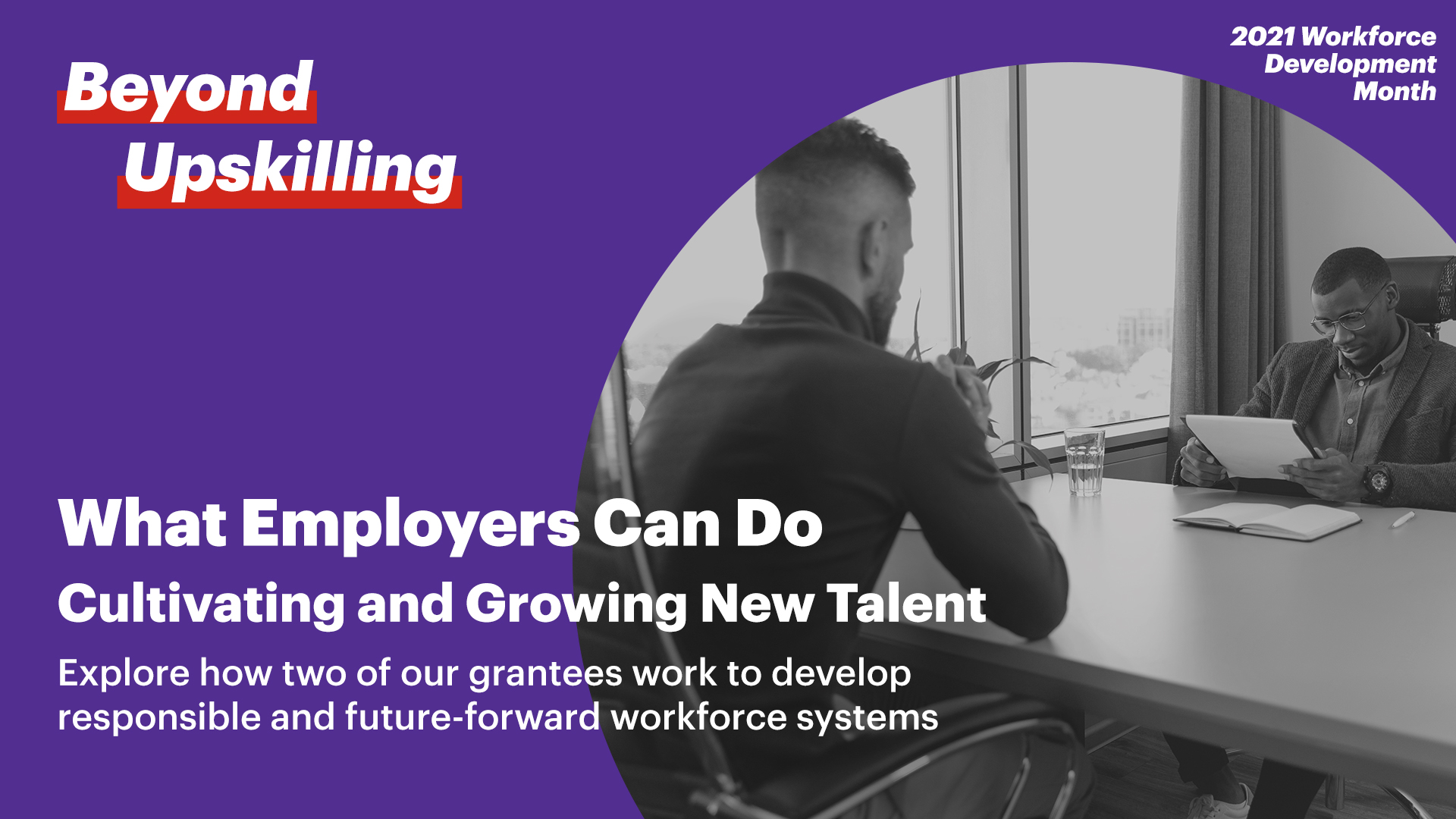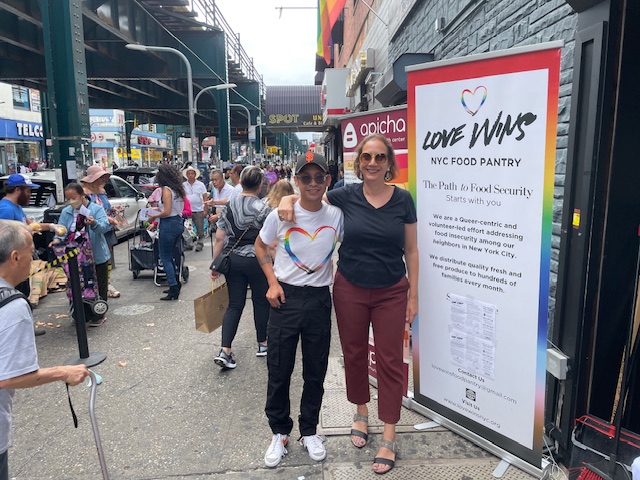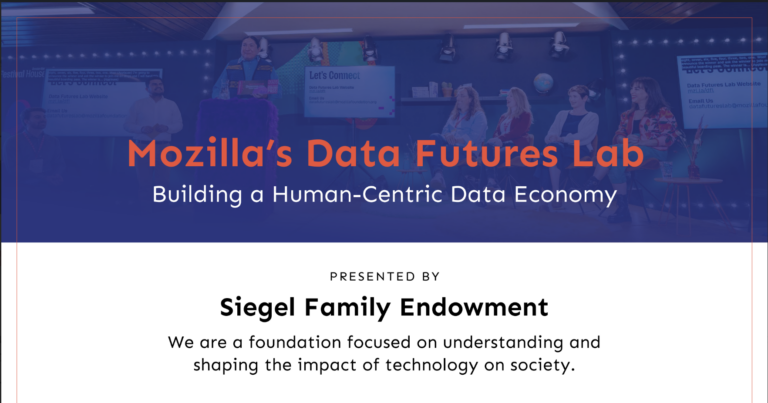
As the innovation economy continues to evolve and exert new demands on people’s time, skills, and education, creating a more adaptable and inclusive workforce is becoming increasingly urgent. Siegel Family Endowment’s grantees have significantly advanced the conversation around career adaptability, transferable skills, job quality, meaningful credentials, and employment. Throughout September, Workforce Development Month, we’ll examine the work they’re doing to create supportive career systems, and to rethink training, access, and cross-sector collaboration. In this second article in SFE’s ‘Beyond Upskilling’ series, we’ll explore some of the new conditions and tools that individuals can use to participate more effectively in the innovation economy.
The labor market has been upended by the COVID-19 pandemic and each of the adjacent, related, and overlapping crises that it has sparked. Questions around employee safety, changing work environments, fair pay, childcare, and healthcare have all become increasingly urgent, and intersecting areas of uncertainty have led many to reconsider their relationship with work and their jobs on a fundamental level.
Creating an innovation economy that thrives in concert with and in response to these dynamic issues is going to require structural change – from the ways we prepare, hire, promote, and train people for and within careers, to the ways we integrate new technologies alongside human labor in the workplace, to the ways employers and employees work with each other. Many employers are also focusing on new ways to keep their employees engaged and growing through their work, and are developing systems and resources to prime their teams for continual growth – both in their own workplaces, and in the broader workforce more generally.
There’s a lot that employers can do to help their employees access upward career trajectories and to empower them to pursue rewarding, meaningful, and worthwhile work. It’s all a part of creating a strong employment ecosystem that’s resilient to change, and that advances new thinking that can help more people achieve balanced, remunerative, and upwardly mobile careers. How can organizations in our grantee community, including skills training programs and organizations that are preparing employees to participate in the innovation economy, collaborate with employers and better guide and inform their hiring and mentorship practices? And how can this work level up to a more resilient workforce that’s poised for continued growth?
We’ll examine the work of two grantees who are working closely with employers to create new pipelines to employment, develop resources and networks of support, and create systems that achieve balance in an increasingly complex workforce.
Helping Diverse Talent Succeed
Pursuit is a Queens, New York based organization that helps low income people without a college degree attain the necessary skills and access to networks that will help them become leaders in the innovation economy. Since launching in 2011, Pursuit has aimed to address hiring gaps in the tech industry, and has developed substantial hiring pipelines and relationships with some of New York City’s leading employers in the worlds of tech and finance; graduates of Pursuit’s tech skills training programs are frequently hired by companies like Uber, LinkedIn, Apple, Citi, and more.
While the grantees highlighted in the previous post in this series prioritize tech jobs that are directly adjacent to coding and computer science, Pursuit prepares program participants for roles that are expressly related to software engineering and often goes even further. Pursuit’s team and leadership also works alongside leadership at the organizations where they place participants to help them expand the scope of their hiring practice, and shift the criteria that they use to make hiring decisions. By providing these employers with highly skilled talent, and by challenging the terms that they traditionally use to make hires, Pursuit is able to motivate high-level, evidence-driven change at some of the country’s leading tech companies.
One of the key areas where Pursuit helps employers strengthen their organizations is around improving and expanding the diversity of employee communities by challenging degree-based barriers to hiring. Many of their training programs hinge on employer collaboration and mentorship, and present opportunities for employers to support new and emerging talent from nontraditional backgrounds. Their Level Up Program, for instance, prepares blue collar and non-traditional workers for careers as software engineers, and gain access to hiring pipelines and mentorship opportunities with top technology and finance companies.
Pursuit is also expanding their network of employer partners, and scaling their programs nationally through partnerships with a diverse array of funders, including SFE and Andreessen Horowitz. By encouraging employers to recognize the importance of cultivating hiring practices that look beyond traditional pipelines, highlighting the importance of adjacent skillsets found in nontraditional areas of work and expertise, and supporting mentorship and resource development within major organizations, Pursuit is able to advocate for meaningful, system level changes that come from within.
Investing in New Communities
Since 2014, The Knowledge House (TKH) has supported Black and Brown technologists in the Bronx with digital skills training and job placement networking services for innovation economy jobs across New York City and beyond. Over the course of the organization’s lifetime, TKH has developed relationships with employers that go beyond the hiring process and pipeline. In their relationships with JPMorgan Chase and Capital One, for example, the scope of their involvement has expanded to match the bank’s growing interest in growing more diverse employee communities and pipelines.
One of the key behaviors that TKH’s founder and CEO Jerelyn Rodriguez advocates for in hiring partners is a willingness to invest directly in organizations and talent. “We started The Knowledge House not only so that people have access to high paying jobs, but to empower people to be innovative,” said Rodriguez in a recent interview. “We’re pioneers. We historically have created things. I think that opportunity to empower people of color and low-income communities to become producers versus just consumers is so important. We wanted to make sure the Bronx was not left out of the innovation economy.” Some of the most successful partnerships with employers have expanded to include research and support services, and strategic guidance on how to best scale their programs impactfully.
Concluding Thoughts
It takes a lot to achieve an effective match between employee and employer, and without closer alignment, collaboration, and resource sharing, gaps are likely to persist. When employers play an active role in strengthening their employees’ skills, abilities, and support networks, the impact is a stronger innovation economy that works for all participants.
In the last and final installment in our Beyond Upskilling series, we’ll focus on the uniquely human characteristics that are critical to success in the innovation economy, and the non-digital factors that are shaping the future of work.





